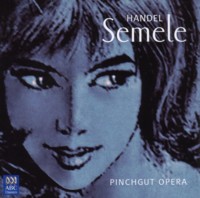Semele
was originally performed as an oratorio, but its innately dramatic story
means it is often staged in operatic form. This recording derives from just
such a performance, and as with most such live recordings, this has its
advantages and disadvantages. On the one hand, it arises from a reasonably
coherent dramatic conception of the work which transmits itself to the
recording, while on the other there is a certain amount of stage noise,
aurally inexplicable audience laughter and applause.
Musically, this is generally a fine
recording, featuring the baroque specialists Sirius Ensemble whose members
Anna Macdonald (violin) and Erin Helyard (keyboard) approach baroque music
from a scholarly as well as a performance point of view, as can be seen in
Helyard’s heavily annotated liner notes. The choral group Cantillation,
while not specialising in early music, has been garnering much praise for
performances and recordings across a range of musical styles, as has their
director, and the conductor here, Antony Walker.
Some cuts have been made, consisting of
three arias, one chorus and a few lines of recitative. The missing arias
are Semele’s “The morning lark” (considered by Winton Dean to be “hopelessly
out of place”), and two for Athamas, “Hymen haste” (which Dean described as
“tedious on any reckoning”), and “Despair no more”. The chorus “Hail Cadmus
hail” could be argued to be redundant on dramatic grounds, as it doesn’t
tell us anything new, and omitting it lets us get straight from Cadmus’s
impressive observation of Semele’s capture by the divine eagle to her
reassuring (?) assertion of a happy outcome (“Endless pleasure”).
The orchestral playing is smart and
sensitive where it needs to be; the overture is at first perhaps a little
too stately, but soon livens up. The second act symphony is very sprightly,
and while the tempi tend overall to be brisk, they are never rushed. The
choral singing is generally exemplary, in terms of cohesion, dynamics and
diction, and in conveying the appropriate drama. They can be nicely hushed,
as in delivering the line “O’erwhelme’d with sudden night the day expires”
(in “Avert these omens”), amazed and terrified (“Oh, terror and
astonishment!”) and joyously happy, as in the last chorus.
Unfortunately the weak link is the title
role. Anna Ryberg has just the wrong kind of voice for Semele, with a most
obtrusive vibrato, and also evincing pitch problems in several places. In
the dual roles of Ino and Juno however Sally-Anne Russell shines, vocally
and dramatically. Her mezzo voice is firm and even, always accurate and
flexible in the coloratura, and she delivers some very nice
cadenzas. She also differentiates the two parts, Ino as the mousy, put upon
sister and Juno as the vengeful bitch goddess being both convincingly
etched. Angus Wood was singing as a baritone until this part came his way,
marking his transition to tenor. One of the younger stars of the Australian
operatic scene, he is well on his way to his new fach, but his voice here is
still distinctly baritonal. He conveys the lounge lizard aspect of Jupiter
well in the second act however, and also the more thoughtful musings of the
god defeated by his wife in Act III. Countertenor Tobias Cole has a
pleasant voice which never sounds too covered, although his pitch wavers a
little here and there. Stephen Bennett is a veteran performer, and his
resonant bass is well deployed in his dual role. Iris’s aria is well
handled by Belinda Montgomery’s pure sweet and accurate soprano.
While the earlier recordings of Nelson and
Gardiner both have their drawbacks, they at least both have an excellent
Semele at their centre, in Kathleen Battle and Norma Burrowes,
respectively. While this new recording is welcome on many fronts, it does
lack that important central performance which would lift it to the ranks of
these earlier versions, more is the pity.


